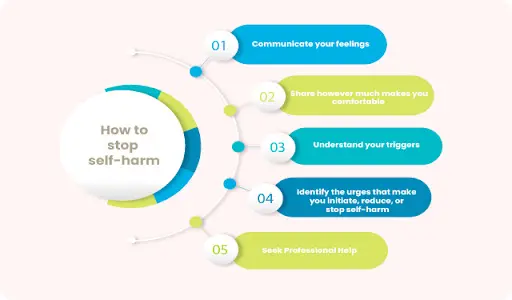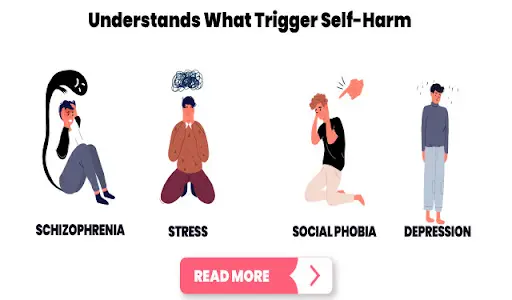Introduction
Self-harm is a way of dealing with painful memories, complicated feelings, or situations beyond your control by hurting yourself. Though performing self-harm, you may feel a sense of release; this is short-lived, as it does not address the cause of your distress. This article will deal with the concept of self-harm, its reasons, alternatives to self-harm, and how to stop it.
What is Self-harm?
Self-harm is intentionally hurting yourself to cope with intense or overwhelming situations or feelings. In some individuals, self-harm may transform emotional pain into physical pain, giving a sense of being in control, punishing yourself for certain textures or experiences, or expressing things that are difficult to verbalise. Self-harm can include burning, cutting, scratching your skin, or taking an overdose. Sometimes self-harm may be less obvious, like misusing drugs, overexercising, having unprotected sex, or not eating right. Self-harm can result in a short-term feeling of satisfaction. However, this is short-lived, as it does not address your underlying concerns and despair. Self-harm can make you feel worse about yourself, as it can be associated with the rise of challenging emotions. Self-harm is more common in young people, women, people with mental issues, or people who have been abused or face stigma and discrimination. Self-harm, once started, can be addictive and difficult to stop.
Why Do People Self-Harm?
The reasons people do self-harm can vary for different individuals.
- People may self-harm to deal with the present or past traumatic incidents or overwhelmed feelings.
- Other reasons for self-harm can include work or school pressures, bereavement, bullying, job loss, low self-esteem, increased stress, or having complicated emotions like anger, depression, anxiety, or numbness.
- You may not know why you are self-harming in some cases. In this case, receiving professional support can help. Self-harm may make you feel in control of your body.
- In some cases, previous traumatic incidents to specific body parts may induce self-harm behaviours in those areas.
- Some individuals may self-harm as a way of punishing themselves. There is a relation between self-harm and suicidal thoughts in some cases, but people who usually self-harm only want to hurt themselves instead of dying. Though self-harm brings you temporary relief, it is essential to note that it becomes difficult to break once you enter the self-harm cycle.
What to do instead of Self-harm?
Though many individuals may stop self-harming on their own, finding various ways to distract themselves from self-harm can help them get through a challenging time.
- Try seeking support from a friend, family member or a professional and speak about your feelings.
- If you think you have feelings that trigger self-harm, try to express that emotion more safely.
- Try distraction or waiting before self-harm, like listening to music or going for a walk, which helps you to deal with the feeling of self-harm.
- Instead of self-harm, try to relax your anxiety or unresolved feelings by adopting deep breathing or other relaxation techniques.
- You can try writing down your feelings instead of self-harming.
- If you have suicidal tendencies, do not hesitate to reach out for professional help. It requires courage to ask for support, but remember that talking to someone about it can help relieve your mind and unresolved anxieties.

How to stop self-harm?
If you feel ready to stop self-harm, confiding in another person is the best way to prevent self-harm.
- Communicating with others helps you focus on your feelings.
- You can share as little as you want, whatever makes you comfortable.
- Understand the patterns of self-harm by identifying what causes you to self-harm. Triggers can be situations, people, specific feelings or thoughts that cause you to self-harm.
- Identify the urges that make you initiate, reduce, or stop self-harm.
- By writing down your patterns in a diary, you will identify what the triggers are for your self-harm behaviour.
- Once you identify these patterns and motivations, you can approach someone you trust to help you if you find them distressing.
- By accepting your feelings, seeking professional help, and improving your self-esteem, you will be able to stop self-harm.
Is Self-harm good or Bad?
Self-harm may feel good at the time because you get a temporary release of the unwanted feelings.
- However, if you do not resolve the underlying distress, self-harm will be just a quick fix for your problems.
- Self-harm may get addictive, and you may find it difficult to stop once you get into the cycle of self-harm. You may feel that you are occasionally self-harming to deal with the overwhelming distress.
- However, the deep-rooted emotional and psychological issues will remain untreated as long as self-harm is only a temporary solution. If your habit of self-harm continues for a longer duration, you may find it difficult to stop.
- Recovery after years of self-harm can take a lot of work, but it is not impossible. With support, either by seeking professional help, support groups, online support, or friends, you can learn to accept your feelings, understand your self-harm, and build your self-esteem, thus improving your overall well-being.
Conclusion
Self-harm is harming yourself on purpose. It is not a mental illness but a sign of mental distress. You may self-harm for various reasons, like finding it difficult to cope with a particular situation, emotion, person, or other known causes. You may also self-harm to manage feelings, communicate, have some sort of control, or punish yourself. Furthermore, you may self-harm by cutting, scratching, overdosing on alcohol or mediation, burning yourself, or orbiting. Self-harm can trigger suicidal ideation too. If you feel that your self-harming is getting out of control, you can try to divert your attention, identify the triggers, or seek professional help. Sharing your feelings regarding self-harm can help you feel less alone. Though self-harm feels like an easy solution to your problems, it is only a temporary band-aid to your underlying despair and distress. Seeking professional help from someone you trust is your way to recovery.
Reference Links





